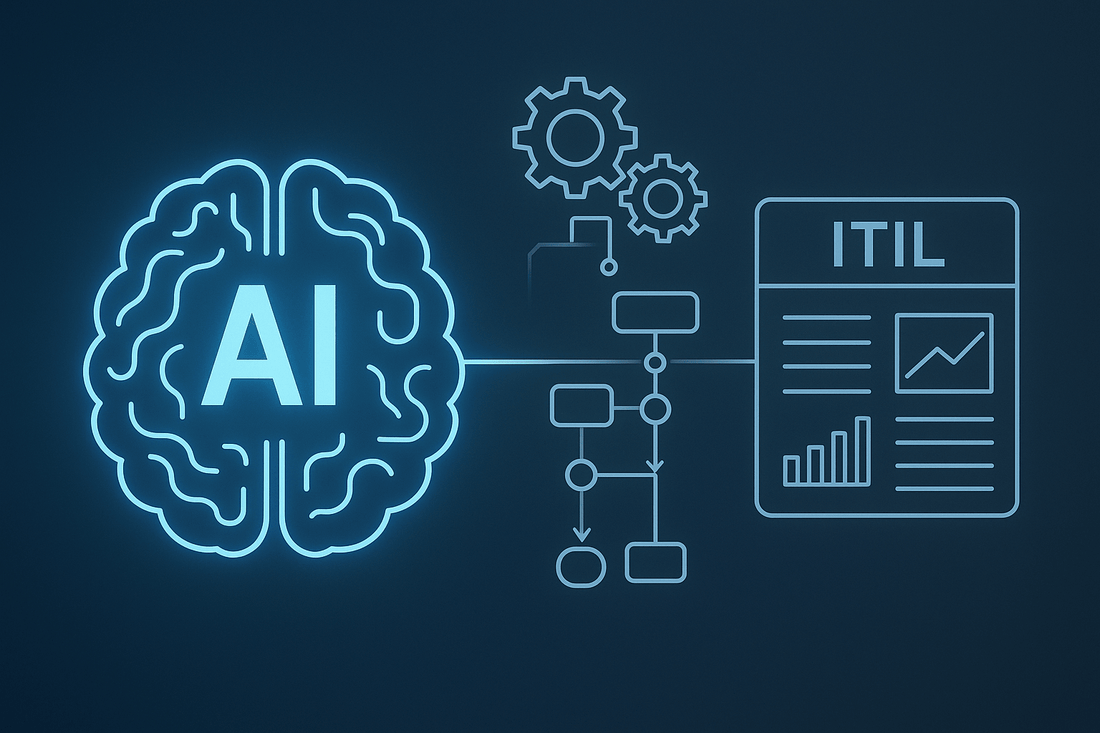
Using AI in ITIL to Make IT Service Management Work Smarter
shane elaiza asidaoShare
The world of technology has undergone tremendous change in recent years. Since the dawn of the computer age in the 20th century, the pace of innovation has been relentless. From the rise of personal computers in the 1980s to the internet boom of the 1990s, we've entered a truly digital age; forever transforming how businesses operate and how people connect.
This digital transformation not only changed industries but also paved the way for smarter, more efficient IT practices. Enter ITIL and, more recently, artificial intelligence (AI)—two game-changers for modern IT service management.
The Rise of ITIL: A Response to Growing IT Complexity
As IT infrastructures expanded, businesses struggled with challenges like system downtime, inconsistent processes, and inefficient workflows. The UK government's ITIL framework (Information Technology Infrastructure Library) was developed as a solution, offering a structured way to standardize IT services and align them with business goals.
Over time, ITIL evolved to stay relevant in an increasingly tech-driven world: introducing concepts and practices that have become foundational in IT service management.
AI in ITIL: A Perfect Match for Smarter Service Management
When integrated into ITIL practices, AI enhances productivity, efficiency, and service quality. Here's how:
1. Incident Management
- AI tools can analyze, categorize, and prioritize incidents.
- Chatbots handle Level 1 support, reducing ticket resolution time.
- ML algorithms suggest solutions based on past cases.
2. Problem Management
- AI detects patterns and predicts recurring issues.
- Preventive measures reduce downtime and improve reliability.
3. Change Management
- AI assesses change risk and simulates outcomes.
- Suggests optimal implementation timelines, minimizing service disruption.
4. Service Desk Automation
- NLP-powered virtual agents handle user queries autonomously.
- Frees up staff for complex issues, improving service quality.
5. Knowledge Management
- AI maintains a dynamic, evolving knowledge base.
- Delivers relevant information to agents in real-time.
6. Security Management
- AI identifies vulnerabilities and prevents breaches.
- Predictive analytics ensure real-time threat response.
Real-World Examples: How Leading Organizations Are Putting AI and ITIL to Work
AI isn't just a buzzword, it's making a real difference in how organizations manage their IT services. Here’s how some of the biggest names in tech and consulting are using AI alongside ITIL to work smarter:
- IBM uses its Watson AIOps platform to help IT teams spot and resolve incidents faster. By automating root cause analysis, they’re able to reduce downtime and keep their systems running smoothly.
- ServiceNow has built AI right into its ITSM platform, using predictive intelligence to flag potential issues before they escalate. This helps support teams respond more quickly and proactively.
- Deloitte is applying AI to streamline ITIL-based processes like problem and change management. Across its global operations, this has helped cut back on manual work and save significant time.
These companies show that AI and ITIL aren’t just a good match—they’re already working together to drive real results in the field.
Pros and Cons of AI in ITSM
Benefits:
- Automation: Speeds up mundane tasks and reduces human error.
- Cost Savings: Fewer resources spent on repetitive activities.
- Predictive Analytics: Prevent issues before they happen.
- Faster Decision-Making: Real-time insights from vast datasets.
Challenges:
- Data Privacy: Sensitive data must be securely managed.
- Bias in Algorithms: Biased training data can cause unfair decisions.
- Job Displacement: Routine roles may evolve, requiring upskilling.
Strategic Takeaway: How to Leverage AI Effectively
To reap the full benefits of AI in ITIL, organizations should:
- Implement governance to ensure AI aligns with business goals.
- Upskill teams to adapt to evolving technologies.
- Use AI to augment human decisions, not replace them.
When deployed thoughtfully, AI and ITIL work hand-in-hand to modernize IT service management and drive digital transformation.
